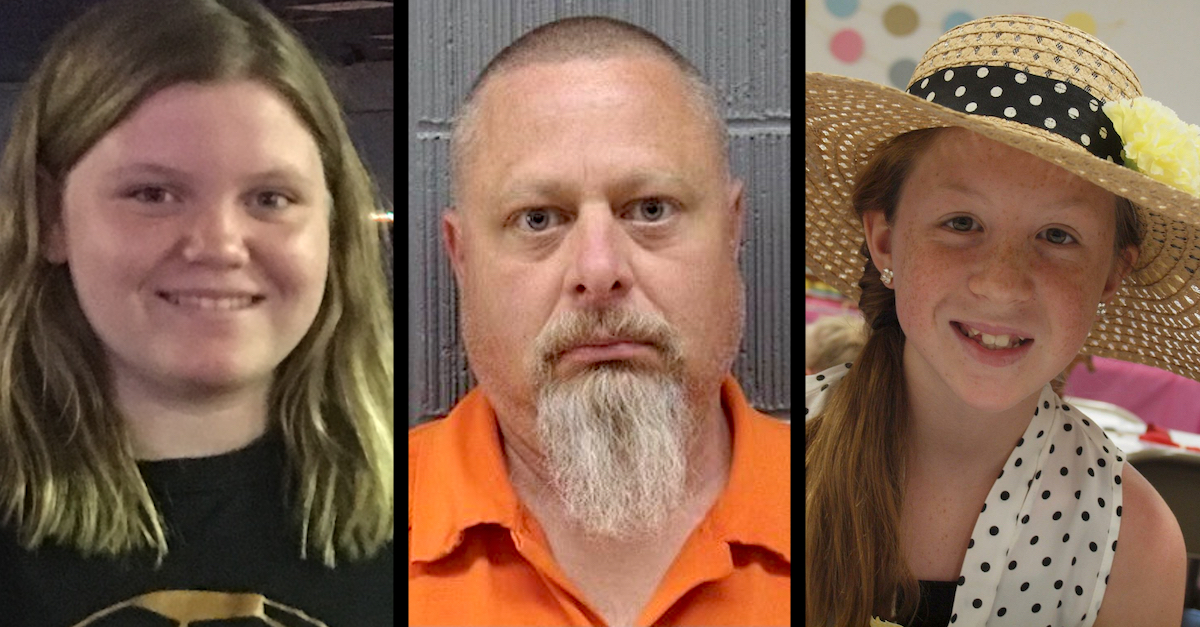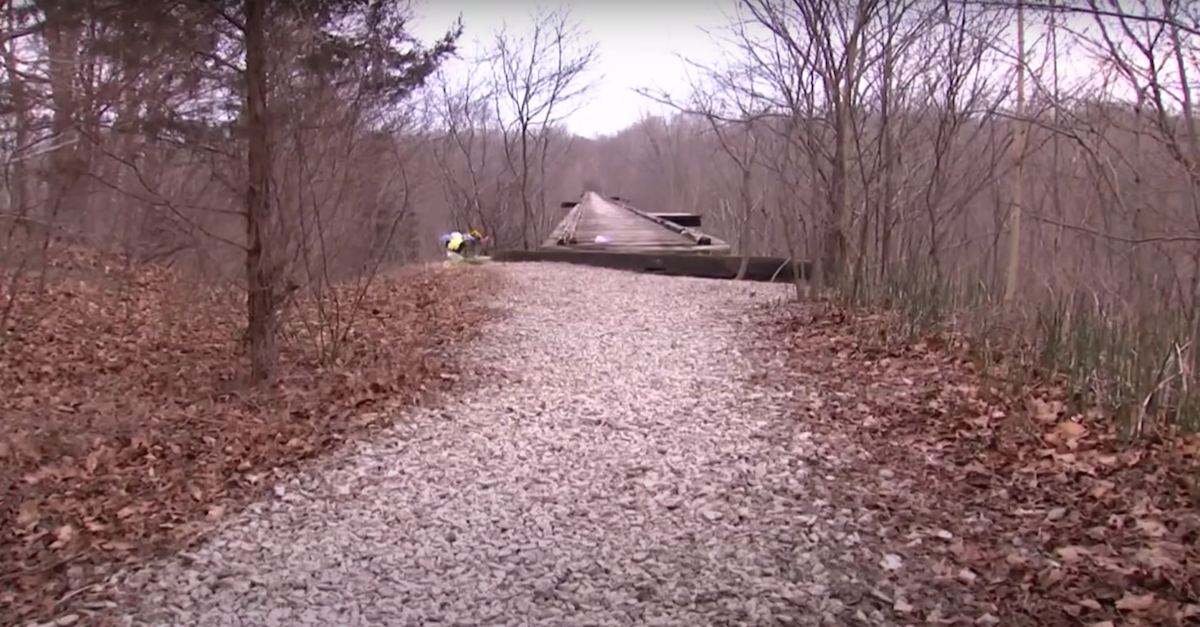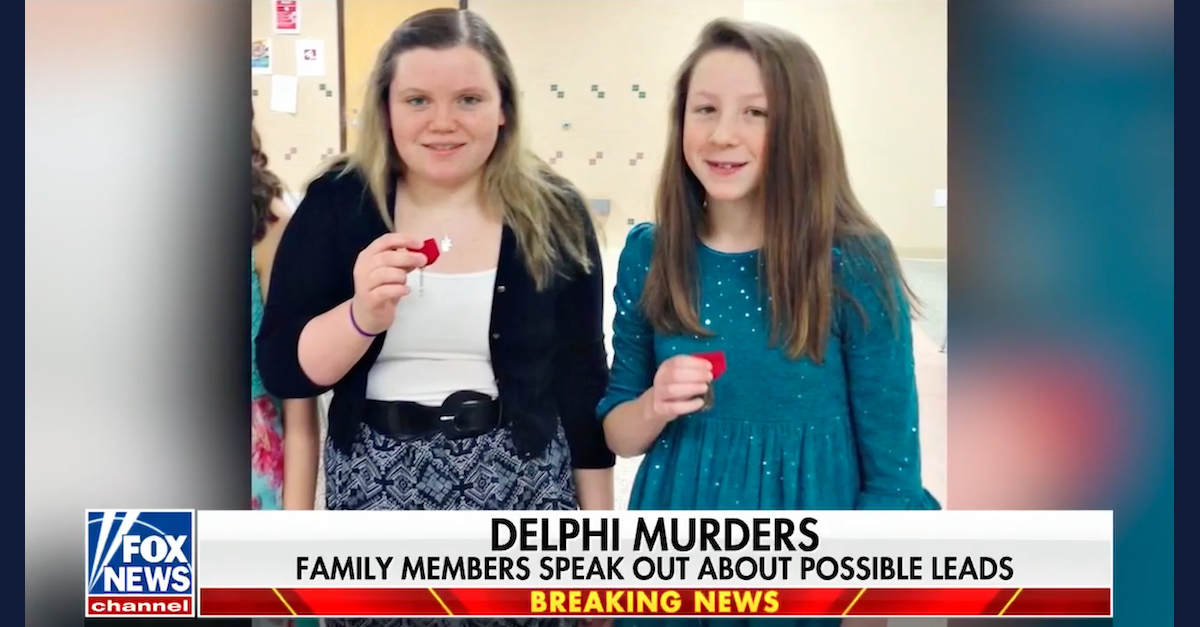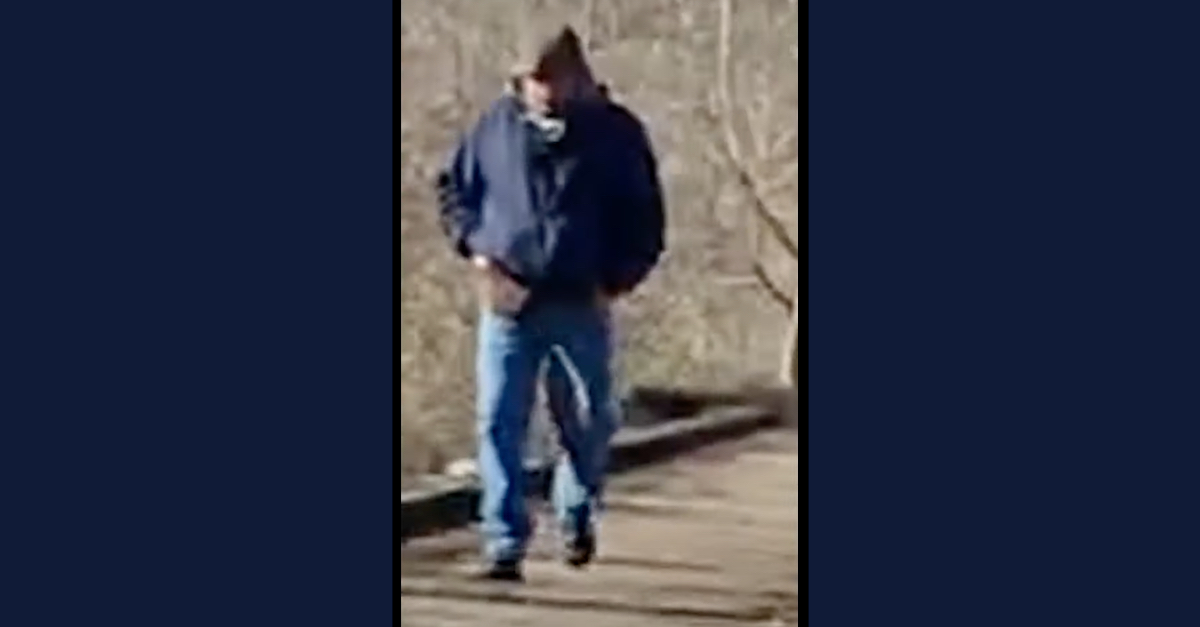
Liberty “Libby” German, Richard Allen, and Abigail “Abby” Williams.
Delphi Murders suspect Richard Matthew Allen, 50, stands accused of murder under a specific subsection of Indiana’s statute which involves at least one underlying offense, a court docket in the case made public for the first time on Wednesday indicates.
Most, if not all, of the actual documents in the file remain sealed, but a series of entries on an online Indiana court docket sketch the outlines of the closely watched criminal matter. Law&Crime has cross-referenced the terse and unilluminating docket entries to shed some light on the case.
The entries do not currently list a defense attorney for Allen, but they do say he’s being held on the aforementioned $20 million bond in “cash or corporate surety.” It had previously been reported that Allen was being held without bond.
Citing the local prosecutor’s office and the local sheriff’s department, Indianapolis FOX affiliate WXIN reported Wednesday evening that the bond entry was some kind of error, but the prosecutor’s office never returned Law&Crime calls to confirm the dollar amount listed on the docket when we inquired about it earlier Wednesday afternoon. Nor was Law&Crime able to reach the Carroll County Clerk of Court’s office; it is closed as a matter of usual business on Wednesday afternoons. The Clerk of Court’s office previously told Law&Crime on Tuesday that it considered the online docket to be the best source of information about the matter going forward.
A smattering of other entries in the case docket are dated Friday, Oct. 28, 2022, when news leaked out that Allen had been arrested. It is on that date that the prosecution formally was opened and a “verified request to prohibit public access” to the records was filed. An immediate order issued by Carroll County Circuit Judge Benjamin A. Diener sealed various records in the case.
The information and a probable cause affidavit — both of which Carroll County Prosecutor Nicholas C. McLeland said on Monday would remain sealed — were also filed on Oct. 28.
McLeland and the state police announced on Monday that the charges are in connection with the deaths of Liberty “Libby” German, 14, and her best friend Abigail “Abby” Williams, 13. The young teens vanished while walking the Monon High Bridge Trail near Delphi, Indiana, on Feb. 13, 2017. The trail traverses an abandoned stretch of the old Monon Railroad and crosses a tall trestle.

A screengrab from WTHR-TV and YouTube shows the Monon High Bridge and a small memorial for the two young teens killed nearby.
The court docket indicates, as McLeland previously announced, that Allen is charged with two counts of murder. Until now, we didn’t know precisely which subsection of Indiana’s murder charge was at play. The docket says Allen is charged with murder under Ind. Code § 35-42-1-1(2), which is a murder involving a specific underlying criminal offense.
Basic Murder Law in Indiana
By way of comparison, let’s start with Ind. Code § 35-42-1-1(1), the Hoosier State’s basic murder statute. It defines and criminalizes murder as having occurred when a person “knowingly or intentionally kills another human being.” Those words are brief, but the reality is more complex — perhaps explaining why prosecutors did not choose this particular option in Allen’s case.
To secure a conviction on the basic charge, according to Indiana’s model jury instructions, the state must prove four elements beyond a reasonable doubt: (1) the defendant (2) killed (3) each specific victim in a (4) knowing and intentional matter.
That might sound simple, but at times, it is not.
Proving the fourth element can sometimes be vexing. A review of a few Indiana criminal appeals suggests that convicted defendants do litigate the issue of whether prosecutors proved their crimes were “knowingly or intentionally” committed — especially in cases which involve an accomplice or a theory of accomplice liability.
Plus, in Indiana, voluntary manslaughter is a lesser included offense to murder, and the model jury instructions suggest that it can operate as somewhat of a default when coupled to a murder charge. Voluntary manslaughter involves a killing committed in “sudden heat.” The jury instructions say the state has to prove a lack of “sudden heat” to convict an individual of murder. If the state fails to prove that sudden heat did not exist, manslaughter is proven, and the jury default to that count, the model jury instructions indicate.

Libby German and Abby Williams. (Image via a FOX News screengrab.)
Murder During Another Crime
That background is important as we look toward the charge the docket says Allen actually is facing. It’s verbose, but in some ways it is less complex.
The specific charge being alleged against Allen applies when a defendant:
(2) kills another human being while committing or attempting to commit arson, burglary, child molesting, consumer product tampering, criminal deviate conduct (under IC 35-42-4-2 before its repeal [this involves deviate sexual conduct]), kidnapping, rape, robbery, human trafficking, promotion of human labor trafficking, promotion of human sexual trafficking, promotion of child sexual trafficking, promotion of sexual trafficking of a younger child, child sexual trafficking, or carjacking (before its repeal)[.]
It is unclear from the docket precisely which underlying offense or offenses is alleged in the Delphi case — but the list of possibilities contained within the statute is harrowing.
It is possible that kidnapping is alleged because the authorities long ago publicized a brief video clip recorded by Libby German of someone saying “guys, down the hill.” Most of the clip has never been made public, nor have many other details about the grim case. But, again, the docket is silent as to the specifics.

A man appeared on a brief video clip recorded by Libby German before she died. The FBI and local authorities released only a few seconds of the recording and a short clip of what is believed to be the man depicted here saying “guys, down the hill.” (Image via the FBI.)
Regardless of which underlying offense is at play, the murder charges — as they are currently listed under Ind. Code § 35-42-1-1(2) — will require prosecutors to prove as follows: (1) that the named defendant (2) killed (3) each specific victim (4) while “committing or attempting to commit” the underlying offense.
And that might be easier, depending on the facts of the case. It appears from the statutes themselves and from the model jury instructions that prosecutors will not have to dance around proving a lack of “sudden heat” (should the lesser-included offense come into the equation). Nor will prosecutors have to negotiate the minefield of proving that the deaths themselves were knowing or intentional.
Generally speaking, statues such as the one cited in Allen’s docket require prosecutors only to prove that deaths occurred during the commission of an underlying offense — even unintentionally. Again, depending on the facts of the case, that burden can oftentimes be easier for the state to carry.
The decision of which charge to apply to a case is strategic, and here, prosecutors aren’t saying much. Beyond announcing the charges and indicating that the case file itself remains sealed, they’ve remained tight lipped. McLeland’s office has refused to return Law&Crime’s phone calls even to confirm whether the bail amount is indeed accurate.
Additional Details
According to the newly revealed docket, initial hearing for Allen was held on Friday, Oct. 28, at 10:30 a.m.
The docket also reveals — for the first time — when Judge Diener will hold a hearing to ascertain whether any of the currently sealed records in the case will be made public. That hearing is slated for Nov. 22, 2022, at 9:00 a.m., the docket says.
As prosecutors previously announced, a pretrial conference is scheduled for Jan. 13, 2023, at 9 a.m.
A jury trial in the matter is currently scheduled to last five days. It’s scheduled to begin on March 20, 2023, and to conclude on March 24, 2023. It’s rare that a trial date scheduled this early in a proceeding would, indeed, occur on time, but it does happen from time to time. Much will depend on whether Allen waives his right to a speedy trial or enforces that constitutional right.
Under Indiana Criminal Procedure Rule 4, defendants can file a motion for an “early trial.” If such a motion is filed, trial must be held within 70 days of the date of the request. That same rule also contemplates that a criminal trial be held within six months of an arrest — though defendants can request delays, usually so their attorneys can examine evidence and mount a defense.
Law&Crime was unable to secure additional information about the case because the clerk of court’s office was closed for the aforementioned reason.
[Images of the victims via the FBI; image of the suspect via the Indiana State Police.]
[Editor’s note: this report has been updated to reference WXIN’s story which suggests the bail amount listed in court records is not accurate. The headline has also been updated accordingly.]